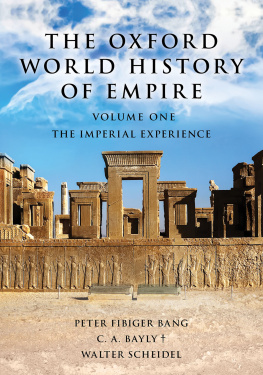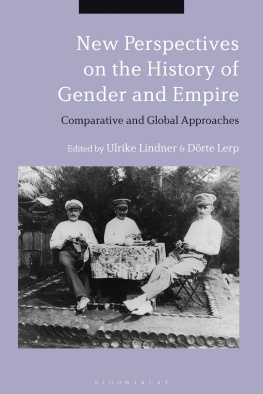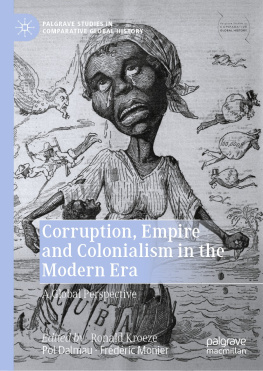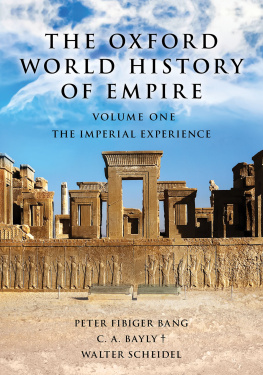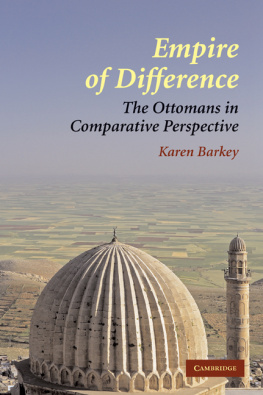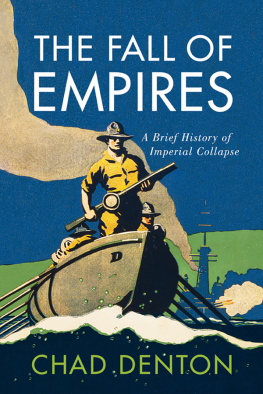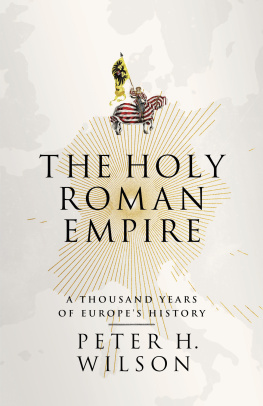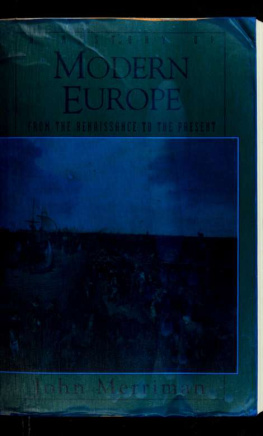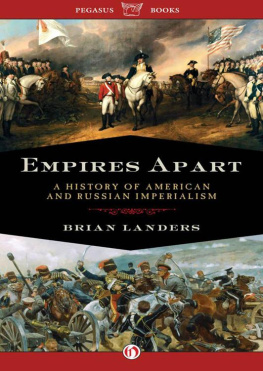The Oxford World History of Empire
In two Volumes

Oxford University Press is a department of the University of Oxford. It furthers the Universitys objective of excellence in research, scholarship, and education by publishing worldwide. Oxford is a registered trade mark of Oxford University Press in the UK and certain other countries.
Published in the United States of America by Oxford University Press
198 Madison Avenue, New York, NY 10016, United States of America.
Oxford University Press 2021
All rights reserved. No part of this publication may be reproduced, stored in a retrieval system, or transmitted, in any form or by any means, without the prior permission in writing of Oxford University Press, or as expressly permitted by law, by license, or under terms agreed with the appropriate reproduction rights organization. Inquiries concerning reproduction outside the scope of the above should be sent to the Rights Department, Oxford University Press, at the address above.
You must not circulate this work in any other form and you must impose this same condition on any acquirer.
CIP data is on file at the Library of Congress
ISBN 9780199772360
eISBN 9780197532744
DOI: 10.1093/oso/9780199772360.001.0001
All histories, then, even histories of the fragment are implicitly universal histories.
C. A. Bayly
(Birth of the Modern World, 2004, 8)
Contents
Volume 1
The Imperial Experience
Prolegomena
Peter Fibiger Bang
Peter Fibiger Bang
Walter Scheidel
Christopher Chase-Dunn and Dmytro Khutkyy
Ian Morris
John Haldon
Cecily J. Hilsdale
Caroline Humfress
Laura Hostetler
Amira K. Bennison
Javed Majeed
Jane Burbank and Frederick Cooper
Kim A. Wagner
Alf Hornborg
James Beattie and Eugene Anderson
Phiroze Vasunia
John A. Hall
Eugene N. Anderson is Professor of Anthropology, Emeritus, at the University of California, Riverside. He received his Ph.D. in anthropology from the University of California, Berkeley, in 1967. He has done research on ethnobiology, cultural ecology, and genocide. His books include The Food of China (Yale University Press, 1988), Ecologies of the Heart (Oxford University Press, 1996), The Pursuit of Ecotopia (Praeger, 2010), Caring for Place (2014), Everyone Eats (2014), Food and Environment in Early and Medieval China (2014), and, with Barbara A. Anderson, Warning Signs of Genocide (2012).
Peter Fibiger Bang is Associate Professor of History at the University of Copenhagen. His work has concentrated on (re)contextualizing the Roman Empire in world history, often in collaboration with his two co-editors, and tackles a wide range of topics, from the economy to state-formation and power. A mainstay has been the attempt to explore comparisons with other pre-colonial empires such as the Mughals, the Ottomans, and the Chinese. Among his books are The Roman Bazaar (Cambridge 2008); with C. A. Bayly, Tributary Empires in Global History (Palgrave 2011); with D. Koodziejczyk, Universal Empire (Cambridge 2012); with W. Scheidel, The Oxford Handbook of the State in the Ancient Near East and Mediterranean (Oxford 2013). Irregulare Aliquod Corpus? Comparison, World History and the Historical Sociology of the Roman Empire (Copenhagen 2014) offers a theoretical and methodological manifesto.
C. A. Bayly was the Vere Harmsworth Professor of Imperial and Naval History at the University of Cambridge, a Fellow of St. Catharines College, (Cambridge), Fellow of the British Academy and Trustee of the British Museum. He used his basis in late Mughal and Colonial Indian history to rethink the character of imperial and global history. Characteristic of his writing was an unmatched capacity to mobilize his wide-ranging interests to identify links between seemingly contradictory or unrelated phenomena and a keen sense of the agency of subject communities. From 2005 to 2009 he was the vice-chair of a European research network, funded by COST and chaired by Peter Bang, that sought to explore comparisons between pre-colonial empires. Among his many writings are Rulers, Townsmen and Bazaars (Oxford 1983), Imperial Meridian (Harlow 1989), The Birth of the Modern World (Malden 2004) and the posthumous Remaking the Modern World 19002015 (Hoboken & Chichester 2018).
James Beattie is an environmental and world historian whose work focuses on the Asia-Pacific region, mostly over the last 200 years. His 12 books and 60 articles and chapters explore cross-cultural exchanges occasioned by British imperialism, and the nexus between environment, gardens, health, and art. He is also founding editor of the interdisciplinary, refereed journal International Review of Environmental History, and co-edits the book series Palgrave Studies in World Environmental History. He is Associate Professor, The Centre for Science in Society, Victoria University of Wellington and Senior Research Associate, Department of History, Faculty of Humanities, University of Johannesburg.
Amira K. Bennison is Professor in the History and Culture of the Maghrib at the University of Cambridge. Her work explores patterns of political legitimation in the medieval to early modern Maghrib from a variety of perspectives, including jihad ideology and urbanism. Her books include Jihad and its Interpretations in Pre-Colonial Morocco (RoutledgeCurzon, 2002), The Great Caliphs (I. B. Tauris, 2009) and The Almoravid and Almohad Empires (Edinburgh University Press, 2016).
Jane Burbank is Collegiate Professor and Professor of History and Russian and Slavic Studies at New York University. She is the author of Intelligentsia and Revolution: Russian Views of Bolshevism, 19171922; Russian Peasants Go to Court: Legal Culture in the Countryside, 19051917; and, with Frederick Cooper, Empires in World History: Power and the Politics of Difference. She co-edited two studies of Russian empire: Imperial Russia: New Histories for the Empire, and Russian Empire: Space, People, Power 17001930. At present she is working on imperial law and Russian sovereignty, viewed from the province of Kazan, and on a history of the Russian legal tradition.
Christopher Chase-Dunn is a Distinguished Professor of Sociology and Director of the Institute for Research on World-Systems at the University of California, Riverside. He is the author of Rise and Demise: Comparing World-Systems (with Thomas D. Hall); The Wintu and Their Neighbors (with Kelly Mann); and The Spiral of Capitalism and Socialism (with Terry Boswell). He is the founder and former editor of the Journal of World-Systems Research. Chase-Dunn is currently doing research on transnational social movements. He also studies the rise and fall of settlements and polities since the Stone Age and global state formation.
Frederick Cooper is Professor of History at New York University. He is the author of Colonialism in Question: Theory, Knowledge, History (2005); Empires in World History: Power and the Politics of Difference (with Jane Burbank, 2010); Citizenship between Empire and Nation: Remaking France and French Africa, 19451960

